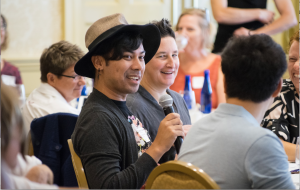While many colleges and universities across the country pride themselves on robust online offerings, Amherst College, a private liberal arts institution in Massachusetts, has remained firm in its commitment to being a residential college where a highly invested community of faculty and students benefit from in-person interaction in the learning process.
So when COVID-19 forced colleges and universities across the globe to reconsider their academic plans for fall 2020, Amherst leaders committed to doing everything possible to ensure faculty could provide students with the personal, dynamic and rigorous experience they expected of Amherst—in person and online.

“Whether you study on campus or remotely, I am confident that the quality of your education will be excellent,” wrote Amherst President Biddy Martin in a July message to students. “I am inspired by the fact that over 90 percent of the faculty teaching in the fall are sacrificing research time during the summer to learn more from one another and from outside experts about the most effective uses of online learning, incorporating novel methodologies that will make for a more engaging and rewarding experience for students.”
“When Amherst moved to online instruction, many of our faculty understandably felt out of their element,” says Dr. Riley Caldwell O’Keefe, Amherst’s director of the Center for Teaching and Learning. “Our faculty care deeply about our students and felt the burden of wanting to continue to carry out instruction with excellence.”
To support faculty in their goal to provide a quality online learning experience, Amherst has partnered with the Association of College and University Educators (ACUE) to prepare faculty through ACUE’s microcredential course, “Promoting Active Learning Online.”
Dr. Jaya Kannan, Amherst’s director of technology for curriculum and research, worked with ACUE in the past while at Sacred Heart University. She understood that to have the greatest impact, Amherst needed to support as many faculty members as possible, while also recognizing they had a short window of time before the school reopens for fall instruction.
Caldwell-O’Keefe and Kannan initially anticipated supporting around 50 instructors through the six-week program—about one-quarter of the number of instructors who teach in any given semester. Seeing the value in such a program, Amherst College’s provost, Dr. Catherine Epstein, opened the course to any faculty member who wanted to participate. Ultimately, 155 faculty enrolled in the summer course. Caldwell-O’Keefe saw the faculty dedication as a testament to their passion for learning and great teaching—regardless of modality.
Faculty who satisfy ACUE course requirements earn a microcredential that may be utilized toward earning ACUE’s Certificate in Effective College Instruction, endorsed by the American Council on Education.
“We looked at various organizations to partner with, but in the end, we appreciated how ACUE’s materials were well-researched and heavily cited. It aligned with the pedagogical language we already use,” Caldwell-O’Keefe says. As the college’s Center for Teaching and Learning moves into its fourth year, both Caldwell-O’Keefe and Kannan believe this professional development builds on the goal of both departments to develop and sustain a community of teaching practitioners. The two were encouraged to see how, almost immediately, the faculty began to share what they are taking away from the course with one another.
“We spend a lot of time talking about how we can continue to build on this momentum—whether that’s inviting faculty to participate in teaching circles or offering Google groups where they can have asynchronous discussions on teaching practices, and allowing the power of peer learning to take over,” Kannan says.
In addition to Caldwell-O’Keefe and Kannan, there were three additional facilitators: Sarah Bunnell from the Center for Teaching and Learning, Megan Lyster from the Center for Community Engagement and outside expert, Dr. Kathy Takayama, as well as support from Lisa Aiken in the CTL, staff in the academic resource team, and multi-media services. This team augmented the ACUE course through convening a weekly 90-minute remote synchronous session for faculty to learn from one another and make the links between the ACUE modules and the specifics of the Amherst context. The facilitation team also integrated additional assignments that encouraged faculty to integrate learning with direct application to their course design, such as developing a community building plan, completing a transparency assignment that demonstrates transparent pedagogy, and creating a course map to ensure course alignment and potentially share with students.
Additionally, Kannan and her fellow cohort leaders have used the group chats to spotlight the incredible work their faculty members have produced for years and which the departments have highlighted on “Teaching with Technology” and “Innovative Teaching Practices” websites.
“This has been a golden opportunity to showcase our Amherst classrooms. While we are not an online school, we’re not behind on digital pedagogy,” Kannan explains. “We’ve enjoyed learning from ACUE’s recommended practices, like online microlectures, and selecting examples across disciplines where our faculty have successfully implemented them.”
“From initial feedback, our faculty members who are participating in the ACUE program feel more grounded and prepared to teach in this current context,” Caldwell-O’Keefe says. “We’re reminding them that they already have a lot of pedagogical expertise and that relatively small changes in teaching can make a big difference in their students’ well-being and success in the course.”
